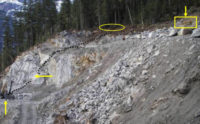
Canada has reset trial for Sept. 7, 2021 in a rare criminal case against a major company—U.S. contractor Kiewit Corp.—for a workplace fatality stemming from a more than decade-old accident on a remote British Columbia hydroelectric project that killed a 24-year-old field employee.
The firm and two of its former site managers, who also were charged last year with one count of criminal negligence in the Feb. 22, 2009 death of rock scaler Sam Fitzpatrick, will face trial in the Provincial Court of British Columbia in Vancouver, according to the B.C. Prosecution Service.
Gerald Karjala, a general superintendent at the time of the accident and a U.S. citizen, has an extradition hearing in U.S. federal court on Nov. 10 after his July arrest in Montana on the charge related to the accident. He is currently free on bail. Also criminally charged is former Kiewit construction manager Timothy Rule, a Canadian citizen.
Robert Kula, Kiewit vice president of corporate communication, declined comment on when and under what circumstances the two managers left the company.
Kiewit, Karjala and Rule will face trial for actions that prosecutors say contributed to the death of Fitzpatrick on the estimated $663-million (C) Toba Inlet run-of-river hydro project, located about 120 miles north of Vancouver and completed in 2010. He was hit by a falling boulder on the steep mountain site, sustaining fatal head injuries, said WorkSafeBC, the provincial workplace safety agency in its accident report.
In a run-of-river hydro project, a small amount of water is diverted up river and channeled through a turbine at a lower elevation, before being returned to the river below. An intake structure and penstock, a large pipe, transport water to turbines and generators in a powerhouse.
Proper penstock routing requires cuts in the rock face. Rock scalers inspect the face, guide workers in how cuts are made and check areas after the face is removed.
Criminal Charge
Kiewit is one of just a half dozen companies that have been charged with criminal negligence in Canada for a workplace fatality under a national criminal code change in place since 2004, 12 years after the 1992 Westray mining explosion in Nova Scotia that killed 26 miners. That tragedy happened despite multiple safety concerns raised by employees, government inspectors and union officials, observers say.
Steven Bittle, an associate professor of criminology at the University of Ottawa, says most prosecutions have been against small firms. “Kiewit is different, it’s unprecedented in many respects,” he says. “It is such a big company and such a prominent construction and engineering firm, especially in North America.”
The contractor ranks at No. 71 on ENR's list of The Top 250 International Contractors, reporting $1.235 billion in 2019 Canadian revenue and $946 million for 2018, and has been a major contractor in energy, industrial, power, and transportation sectors there.
Kula said in an email that the company “has been—and will continue to be—a strong corporate citizen in British Columbia and across Canada, and intends to proceed with the trial and vigorously defend our company in this matter.”
The firm strongly disagrees “with the justification for and timing of the charges,” he said.
The criminal case follows a years-long lobbying effort by the United Steelworkers union and by Brian Fitzpatrick, father of the dead worker and of his younger brother Arlen who was also employed by Kiewit on the site at the time of the accident and witnessed it.
The elder Fitzpatrick, who died in 2017, “came to see me and ask for help,” said Stephen Hunt, union district director in Burnaby, B.C. “It was painfully obvious to us it probably rang the bell for a criminal negligence charge.” The union did not represent Sam Fitzpatrick and was not involved in the case.
Risk Factors
A likely key element of the case is a report by regulators at WorkSafeBC that highlighted a number of safety violations leading up to the fatal accident.
An excavator had done work on a ledge above Fitzpatrick’s location before the boulder that would kill him tumbled. Part of the scaling crew, he was hand drilling a boulder below with ear mufflers on, so he could not hear warnings shouted by co-workers.
The day before the fatal accident, a rock had tumbled down the slope and damaged a piece of heavy equipment.
According to the WorkSafeBC report, Fitzpatrick had raised concerns that day about the “the lack of an emergency and rescue plan in the event of a similar rock fall,” a fellow scaler told investigators.
After the first rockfall, worksite supervisors had decided to halt heavy machine work on a ledge above while Fitzpatrick and other scalers were drilling below, but the word had apparently not gotten through to an excavator operator on the ledge.
“Following the ... incident with equipment damage, the firm did not take adequate measures to prevent a rock fall recurrence,” said the WorkSafeBC report.
The agency levied a $250,000 (C) fine against Kiewit in 2011 for the various safety violations that its inspectors found at the project site—the largest penalty the safety regulator would issue that year.
The fine was reduced to less than $100,000 (C) on appeal two years later by Kiewit, wtth the appellate tribunal ruling it could not determine if company decisions directly led to the boulder striking Fitzpatrick, but still noting that the firm “committed high risk violations with reckless disregard.”
A guilty finding in the criminal trial against Kiewit could have ramifications for the company, potentially interfering with its efforts to win new work on public projects in Canada, Bittle said.
Financial penalties are also potentially stiff. Under the Westray law, there is no cap on fines for more serious “indictable” offenses. The managers could face a long prison sentences if convicted.






Post a comment to this article
Report Abusive Comment